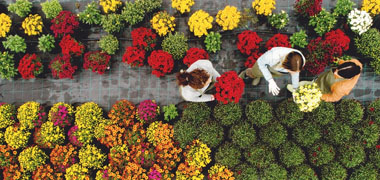
Irrigation courses in New South Wales
Course providers in New South Wales
The following providers offer Irrigation courses in New South Wales.






























Career Pathfinder
Skills shortages + AI Exposure
Discover in-demand careers and understand how each role may be impacted by AI and automation.
- See in-demand occupations across Australia
- Check AI Exposure ratings
- Compare training duration and average income
Further reading


Most popular agriculture courses
8th April 2022
Choosing a security licence course in Australia: A step-by-step guide for jobseekers
10th November 2023All courses
- AHC30722 Certificate III in Horticulture
- AHC20320 Certificate II in Production Horticulture (Horticulture)
- AHC32422 Certificate III in Irrigation Technology
- AHC10222 Certificate I in Agriculture
- AHCWHS302 Contribute to Workplace Health and Safety Processes
- Bachelor of Agriculture and Technology (Sports Turf Science and Management)
- NWP40120 Certificate IV in Water Industry Operations (Irrigation Water Supply)
- AHC20422 Certificate II in Horticulture
- NWP30415 Certificate III in Water Industry Irrigation
- AHC41416 Certificate IV in Seed Production
- AHC50122 Diploma of Agriculture
- AHC50320 Diploma of Production Horticulture
- AHC51920 Diploma of Applied Agronomy
- FBP30921 Certificate III in Wine Industry Operations
- Undergraduate Certificate in Agriculture
- AHC31324 Certificate III in Sports Turf Management
- NWP30222 Certificate III in Water Industry Operations (Irrigation Water Supply)
- AHC50324 Diploma of Production Horticulture
- AHCMOM317 Operate Tractors with Attachments
- 22273VIC Diploma of Agronomy
- PMBWELD302 Electrofusion Weld Polyethylene Pipelines
- AHC20720 Certificate II in Nursery Operations
- RIICRC208E Lay Pipes
- AHC40422 Certificate IV in Horticulture
- AHCMOM304 Operate Machinery and Equipment
- NWP30219 Certificate III in Water Industry Irrigation
- 22650VIC Diploma of Applied Horticultural Science
More about Irrigation courses
Are you looking to enhance your skills in the field of irrigation? New South Wales offers a variety of irrigation courses tailored to meet the needs of aspiring professionals and experienced practitioners alike. Whether you aspire to become an irrigation technician or a landscape designer, these courses provide the essential training that will empower you to manage and optimise water resources effectively. With a focus on sustainability, these educational programmes will enable you to contribute positively to the growing demand for water-efficient practices in horticulture.
The courses available in New South Wales encompass various study areas within the irrigation field. For instance, you might consider combining your irrigation training with specialised knowledge in arboriculture or landscape design. This synergy will enhance your employability as you will have a broader skill set. Training providers in NSW are well-regarded, ensuring you receive credible instruction that aligns with industry standards, preparing you for job roles that demand expertise in efficient water use and resource management.
Participants in these courses can expect to gain hands-on experience and theoretical knowledge that can be applied directly in the field. Locations across New South Wales, from Sydney to rural areas, are equipped with training facilities that facilitate practical learning. Additionally, courses are designed to align with current industry practices, ensuring graduates are job-ready and adept at handling roles in park management or even gardening. Completing an irrigation course can significantly boost your career progression and earning potential in a crucial industry.
Enrolment in an irrigation course in New South Wales is a step towards a fulfilling career that addresses a significant environmental challenge. As water conservation becomes increasingly important, acquiring the skills to manage irrigation systems effectively is invaluable. With numerous reputable training providers available, you can find the programme that best suits your needs, allowing you to thrive in roles that positively impact both the horticultural sector and the community at large.
